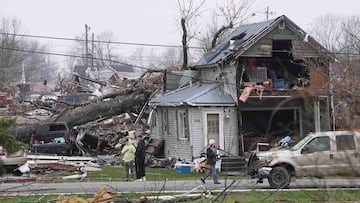What doesn’t homeowners insurance usually cover?
Buying a house is the biggest investment most Americans will make in their life. Thus, insuring it is common sense. But insurance doesn’t cover everything.

Part of the American dream is to own a home of your own but it requires laying out a significant amount of capital. In fact, purchasing a house is the biggest investment most Americans will make.
So, like everything in life, it makes sense to protect such an investment from potential risks. Homeowners insurance can go a long way to cover most of the common threats that may befall a household. However, most policies don’t cover all the risks that may be present.
What doesn’t homeowners insurance usually cover?
Homeowners insurance typically has four types of coverage including that for your dwelling, other structures on your property, personal property and liability for injury to someone else on your property or damage caused to that of a neighbor’s property. It will most likely also cover ‘loss of use’ in the event that your house in temporarily uninhabitable to pay for the cost of living while it is being repaired or rebuilt.
But there are situations of ‘Force Majeure’ or an ‘Act of God’ that may be excluded from your typical homeowners insurance policy. Across the United States there are particular events that are specific to a particular region that are not included in a standard policy, and even some events that can occur anywhere in the US.
Dwelling coverage may cover your house in the event of damage from a tornado or windstorm, but you should check the fine print before taking it for granted. But more colossal events such as an earthquake, sinkhole or landslide are most likely not included.
And then there are hurricanes and flooding. Both of which will typically require a separate policy or deductible.
Whether it’s a few inches or a mile high, flood insurance covers you for the unexpected: https://t.co/gxBSIzol80 #FloodSafety pic.twitter.com/wCHg1k6ARw
— FEMA Grants (@FEMAGrants) March 19, 2024
While the risk of flooding is present in all fifty states, 99 percent of counties in the nation have experienced a flooding event in the last quarter century, this kind of coverage is not typically included in standard homeowners insurance.
Even flood insurance will not cover all water related issues in your house that are not covered by regular homeowners insurance. Unless it was actual flooding under the definition of such, should your house experience a sewer backup, septic tank backup and other water related backups or leaks, your homeowners policy may not give you any reimbursement for the damage caused.
Related stories
Other ‘Force Majeure’ your homeowners insurance typically won’t cover include damage from nuclear accidents, pollution, war or government seizure. Likewise more mundane things such as general wear and tear as well as damage caused by animals and insects.
It is considered your responsibility, as a homeowner, to maintain your property, including repairing and replacing aging home systems and infrastructure. While a deer crashing through your window or a bear knocking down your door may be covered, damage from rodents, termites and your own pets, you will need to take of yourself. Suffice to say, always predict the unpredictable and check the fine print to see what is and isn’t cover when purchasing an insurance policy.



Complete your personal details to comment